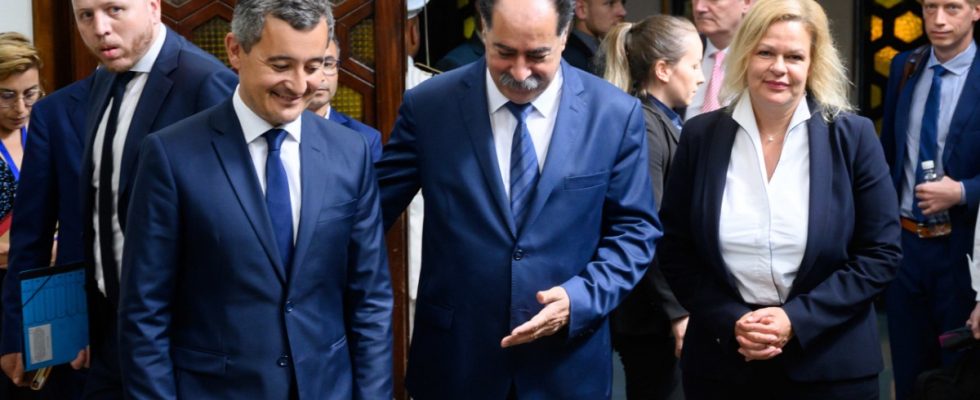Even the friendly beginning of the visit made it clear that the three interior ministers would like to see each other in a pragmatic manner in the future. German Interior Minister Nancy Faeser and her French counterpart Gérald Darmanin landed one after the other at Tunis-Carthage airport on Sunday afternoon. Host Kamel Fekih then welcomed them together, smiling and with a firm handshake. During the two-day visit, the trio wants to explore the details of a partnership between the EU and the North African country of twelve million people.
Because of a campaign launched by President Kais Saied in February against illegal migration and the economic crisis that has persisted for years, Tunisia replaced neighboring Libya as the main point of departure for migrants to Europe this year. More than 51,000 people arrived in Sicily and Lampedusa by early June, the majority beginning the perilous journey in the Tunisian port cities of Sfax, Zarzis or Mahdia.
Tunisia faces insolvency
After the blunt criticism of Saied’s autocratic style of government by the European Parliament and several European capitals, the relationship had cooled noticeably in recent months. One of the reasons was that more than 30 opposition politicians, journalists and former ministers are currently in prison in Tunisia for corruption and conspiracies against state authorities. Now the media has also been banned from reporting on the cases.
However, because of the dramatically increasing number of migrants and an impending insolvency of the state, the EU decided on a remarkable about-face. On June 11th, European Commission President Ursula von der Leyen and the Prime Ministers of Italy and the Netherlands flew to Tunis. Then it was announced that more than one billion euros should flow to Tunisia this year. The country is now a partner of Europe in the region. Tunisian media also rejoiced in the new tone.
In the past, Saied has justified his tough policies with foreign support for the politicians who would have bankrupted Tunisia after the revolution. He also meant Europe. Although Tunisia is de facto bankrupt this year due to the pending repayment of several loans and empty coffers, Saied described the reforms demanded by the International Monetary Fund as dictates. And by that he meant the West.
“The images of the numerous accidents in the Mediterranean and the fear of the rising poll numbers of the right-wing parties in Europe have brought both sides to their senses,” suspects radio journalist Haythem el Mekki, who was recently interrogated by the public prosecutor’s office because of critical questions about the recruitment practices of the security forces became.
China and Russia are courting the new autocrats in North Africa
The common appearance of European politicians in North Africa is not a matter of course. Up until now, it has been normal for diplomats from the former colonial powers France and Italy to assert their own interests in power without consulting their EU partners. They were even on different sides in the Libyan civil war of 2019. Courtship from Beijing and Moscow for the region’s new autocrats has also led to a rethink.
Diplomatic circles have observed with concern that the Russian embassy has recently increased the number of its diplomats immensely. “We want to create a working level here to solve common problems,” said Nancy Faeser to journalists after meeting Saied. The President did not repeat his earlier statement that his country does not want to be some kind of border policeman at the gates of Europe.
Instead, Saied apparently patiently listened to criticism of the dismantling of democracy. Interior Minister Fekih explained to Faeser and Darmanin over lunch that their criticism of the actions taken against the opposition was a misjudgment of the political situation in the country. Nevertheless, Faeser and Darmanin announced that they would continue the partnership dialogue with Fekih.
Berlin wants to transfer more than 20 million euros to Tunis to strengthen border protection and shorten the processing time for work visas. France wants to agree on taking back Tunisians who have entered the country illegally and in exchange for facilitating legal migration.
Fiber: “We must stop dying”
In Tunisia, too, migration is a hot topic in domestic politics. Most recently, President Saied had softened the tone and promised all migrants correct treatment in the port city of Sfax. A few days later, however, a ship with several hundred migrants from Libya reached the Tunisian coast, and the public reacted with outrage.
“We have to stop dying,” said Nancy Faeser in Tunis. She will probably have to come back.

